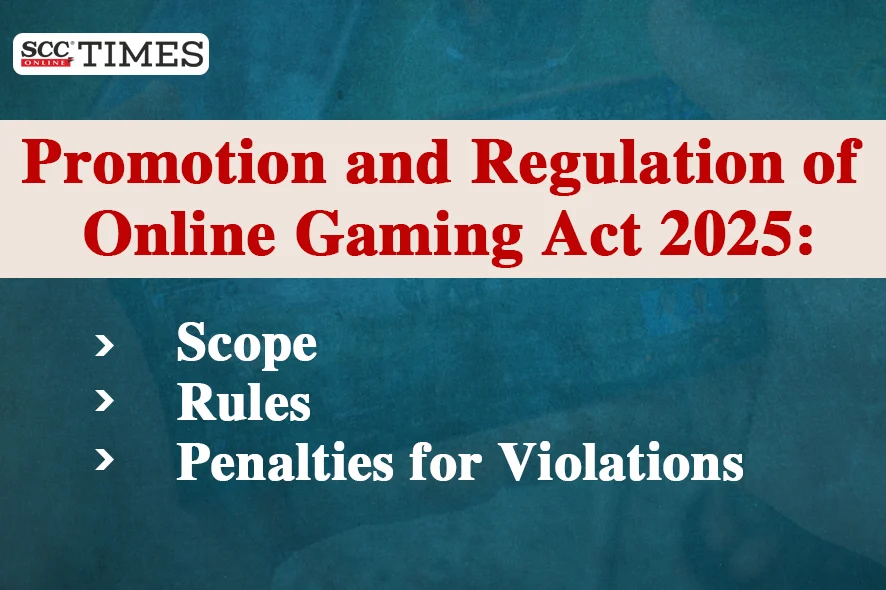On 22-8-2025, the President assented the Promotion and Regulation of Online Gaming Act, 2025, marking a significant legislative milestone in India’s digital governance landscape. This Act aims to strike a balance between fostering innovation in the online gaming sector and curbing the harmful effects of online money gaming. It reflects a comprehensive and forward-looking approach to regulating one of the fast-growing segments of the digital economy.
Key highlights of Online Gaming Act:
-
This Act is a comprehensive structure of 19 Sections distributed across 6 Chapters, each addressing distinct regulatory, enforcement, and definitional aspects of online gaming in India.
-
This Act establishes a national-level legal framework to ensure uniformity in regulation and enforcement across states, addressing cross-border and inter-state inconsistencies, applicable to online gaming services offered:
-
Within India
-
Operated from outside India but accessible to users within India
-
-
The Act provides clear definitions and interpretative guidance on key terminologies to ensure clarity in regulatory treatment of various gaming formats, including:
-
Online Game: Any game played on electronic or digital devices via the internet or other communication technologies.
-
Online Money Game: Games involving monetary stakes or deposits with the expectation of financial rewards.
-
Online Social Game: Games played for entertainment or skill development without monetary stakes.
-
E-sport: Competitive online games recognized as legitimate sports.
-
Other Stakes: Virtual or real items convertible to money, such as tokens, coins, or credits.
-
-
“E-sport” is defined as an online game played as part of multi-sports events, involving organized competitive multiplayer formats governed by predefined rules. It is:
-
Recognised under the National Sports Governance Act, 2025
-
Registered with the designated Authority or agency
-
Determined solely by players’ physical dexterity, mental agility, strategic thinking, or similar skills
-
Permitted to involve registration or participation fees for administrative purposes
-
Allowed to offer performance-based prize money, but strictly prohibited from involving betting, wagering, or staking
-
-
This Act empowers the Central Government to formally recognise and register e-sports as a legitimate form of competitive sport in India, to It actively promote and develop the sector through institutional and policy support.
-
To foster growth and innovation in the e-sports ecosystem, the Government will undertake:
-
Formulation of guidelines and standards
-
Organisation of national and international e-sports events
-
Establishment of training academies, research centres, and dedicated institutions
-
Introduction of incentive schemes and public awareness campaigns
-
Development of indigenous e-sport technology platforms
-
Coordination with State Governments and recognised sporting federations to integrate e-sports into broader sporting policy initiatives
-
-
A central feature of the Act is to levy strict prohibition on online money gaming. It bans:
-
Offering or facilitating online money games.
-
Advertising or promoting such games through any media.
-
Financial transactions related to online money gaming services.
-
-
The Act mandates the creation of an Authority on Online Gaming, which will include:
-
A Chairperson
-
Appointed Members
-
Designation of an existing Authority or agency to perform regulatory functions
-
-
The Authority is empowered to:
-
Determine whether a game qualifies as an online money game
-
Recognise and categorise online games
-
Register games and gaming platforms under the prescribed norms
-
-
The Directions, Orders, Guidelines, or Codes of practice issued by this Authority will be binding on entities involved in:
-
Offering
-
Organising
,
-
Facilitating online games
-
-
The Act prescribes stringent penalties for violations:
-
Up to ₹1 crore fine or 3 years imprisonment for offering online money gaming services.
-
Up to ₹50 lakh fine or 2 years imprisonment for advertising such games.
-
Enhanced penalties for repeat offenders, including mandatory minimum sentences and higher fines.
-
-
The offences under Sections 5 and 7 are classified as cognizable and non-bailable, overriding provisions of the Bharatiya Nagarik Suraksha Sanhita, 2023, granting law enforcement broader powers for immediate action.
-
Notably, if an offence is committed by a company, every person responsible for the conduct of its business will be held personally liable, ensuring accountability at the highest levels of management.
-
Whoever fails to the Directions/Orders of the Online gaming Authority, following will be imposed:
-
Penalty of up to ₹10 lakh
-
Suspension or cancellation of registration
-
Prohibition from offering, facilitating, or promoting such games for a duration determined by the Central Government or the Authority
-
-
Chapter VI grants the Central Government authority to regulate and restrict access to online money gaming platforms. It empowers designated officers to conduct searches, seizures, and arrests without a warrant. Legal protection is provided for actions taken in good faith under the Act. The chapter also allows the government to make rules and resolve implementation challenges, ensuring the Act’s smooth enforcement.
Also Read: What Experts are saying.








Implementation will be watched carefully. The fence should not eat the plants